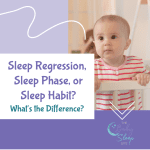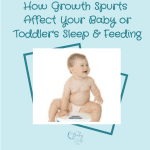
Parents, does it ever feel like the first year of your baby’s life is just one long sleep challenge? Between sleep regressions, teething, illness, growth spurts, and nap transitions, it can feel like your baby will NEVER sleep soundly, because just when you find your sleep “groove”, another change or transition rears its ugly head.
This is especially true of sleep regressions. There are three sleep regressions that we commonly see happen during the first year of a child’s life, and since each one can last for 6 weeks (or perhaps more, in extreme cases!), it can feel like you are moving from one regression straight into another
However, we also commonly hear parents refer to baby growth spurts as sleep regressions. Indeed, some sleep consultants and experts call baby growth spurts sleep regressions, and vice versa.
So what’s this about? Is a sleep regression the same as a growth spurt? Are the two related? Or are they completely different?
Let’s take a look!
Sleep Regression: A Look at Common Baby Sleep Regressions, and Why They Happen
As I mentioned before, we commonly see three distinct regressions during the first year of a baby’s life.
4 Month Sleep Regression
This sleep regression is tough on parents – it can sometimes feel like you’re straight back to having a newborn again, especially if your baby was sleeping through the night and napping well before the regression started! The 4 month regression happens because your baby’s brain and sleep patterns are maturing and changing. Before 4 months, your baby’s sleep patterns are very different from yours; during the 4 month regression, your baby’s sleep patterns are maturing and becoming much more like yours. As a result, you may find that your baby wakes more frequently at night and too early at nap time; this is usually a result of waking between sleep cycles. You can read our original 4 months sleep regression article, or you can read a newer, updated 4 month sleep regression article as well.
8 Month (or 9 Month, or 10 Month) Sleep Regression
If you manage to get your 4 month old sleeping well after the 4 month sleep regression, you’re not out of the woods yet – you still have the 8/9/10 month sleep regression to contend with! The cause of this regression is pretty easy to spot, for most parents – at this age, your baby is going through major developmental milestones! From 8-10 months, most babies are becoming expert crawlers, they’re pulling up on furniture and beginning to cruise around, and they may even be starting to walk.
What’s more, your baby is learning a lot of hand-eye coordination at this time – by 8 months, most babies are becoming able to spot a toy they want, creep/crawl over to it, pick it up with their pincer grip, and then inspect it closely (and perhaps try to eat it!). Truly, this window of time is an explosion of physical development for most babies. No wonder, then, that sleep is disrupted – their brains and bodies are learning so many new physical skills!
12 Month Sleep Regression
This sleep regression is less-common; not every child will go through this one. That may be because it has more to do with naps, and therefore doesn’t have the same overall impact on sleep. Specifically, this regression is characterized by a 12-month old suddenly refusing to take two naps, and refusing to sleep during the first morning nap. Lots of parents assume this means it’s time to transition from two naps to one, but we discourage this.
Most babies aren’t actually ready for just one nap per day until between 15 months and 18 months. So really, this regression has a lot to do with your baby consolidating sleep differently – by 12 months, your baby is likely sleeping very long stretches at night, and getting just 2-3 hours of sleep in naps. This change in sleep consolidation can cause a brief “nap strike” right around 12 months of age. You can read more about the 12 month sleep regression here.
Baby Growth Spurts: When They Happen
If you feel like 3 sleep regressions in the first year of life is a lot, just wait until you see how many growth spurts you can expect in the first year:
- 7-10 days
- 2 weeks
- 4 weeks
- 8 weeks
- 12 weeks
- 4 months
- 6 months
- 8.5 months
- 10.5 months
- 12.5 months
Of course, your baby won’t experience growth spurts at exactly those times (babies aren’t nearly so predictable!) but you can use these as rough estimates. Baby growth spurts are short intervals (usually about a week) during which time your baby will have an increased appetite, and will often wake more at night to feed. And baby growth spurts affect sleep, too. During these baby growth spurts, your baby may also seem extra-sleepy, so even though sleep may be interrupted by extra feedings, you may find that your baby’s overall sleep amounts per day are greater during the growth spurt than they usually are.
Sleep Regression vs. Growth Spurt
So, is a sleep regression the same as a growth spurt? The short answer is no. For one thing, a baby will go through far more baby growth spurts during the first year than she will sleep regressions. Additionally, based on the information above, you can see that sleep regressions have much more to do with mental and physical development, and less to do with simple growth and weight gain.
What’s more, the sleeplessness that comes with growth spurts has a cause – baby growth spurts cause babies to wake more often at night, and early from naps, because baby is hungry and needs to eat. But that’s not true of sleep regressions; during a sleep regression, your baby will wake more at night and have interrupted naps, but you may not be able to find a cause at all (indeed, because often there is no cause that you can see – it’s due to mental and physical development). Finally, growth spurts are usually short-lived (about a week) whereas a sleep regression can last up to 6 weeks (typically 2-4 weeks).
That said, if you compare the timing of each sleep regression against the list of baby growth spurts, you’ll notice significant overlap. Many of the baby growth spurts on the list coincide with the sleep regression stages. So, while sleep regressions and baby growth spurts are not the same thing – you can’t use the terms interchangeably – it’s likely that a sleep regression impacts a growth spurt, and that baby growth spurts impact sleep regressions.








